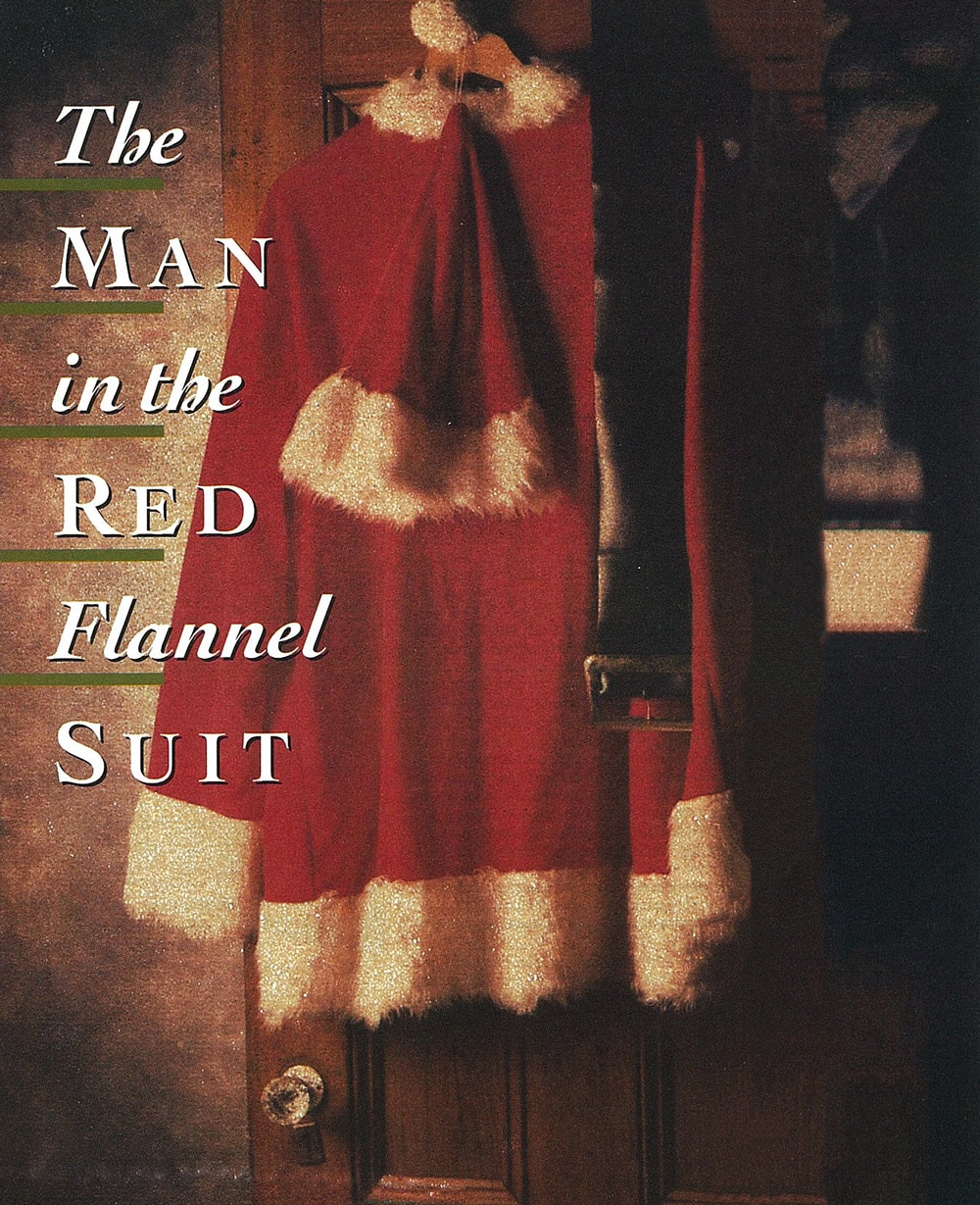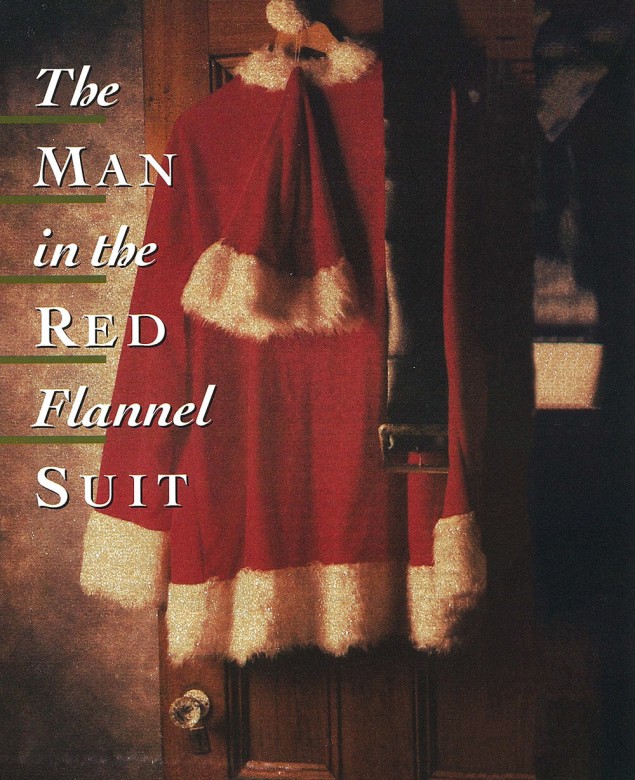The Man in the Red Flannel Suit | Yankee Christmas Archives (December 1992)
Being the town Santa is not all ho-ho-ho and Merry Christmas. A report from the Yankee archives explains the other side of the beard.


by Donald Hall
When we moved to New Hampshire for good in 1975, I was 46 years old, stood six foot one, carried a big beard, and weighed 248 pounds. For years, my cousin Forrest had played Santa Claus at the South Danbury Church Christmas program. Forrest was tired of the role and didn’t have a beard; it was inevitable that I be recruited.
And I was ready for it. When I recall our first year back in New Hampshire for good — restoration to the domain of my grandparents’ house, a daydream from childhood — I feel again the gratitude that poured out of me all day long, month after month. I was ready to wear the red suit and impersonate the all-giver because I was aware of how much I had been given. A decade earlier, my life had been a shambles of stereotypical middle-aged crisis, self-made, but a shambles nonetheless.
Almost two decades later, I remain aware of my good luck, but even happiness becomes a habit. It’s a precarious habit, like all mortal matters, for even the good life ends. Every year I watch it end for people I love. To some degree, happiness encourages dread: When you walk down the street, your trousers rattling with a million dollars in gold, it is reasonable to fear pickpockets.
At a costumer’s in Concord — where theater groups go for dress and makeup, where we rent the gorilla suit of imagined exploit — I bought washable white paint in a spray can, for my beard was a bushy brown. From Forrest I borrowed the communal Santa Claus costume, shared by Danbury Santa Clauses at the church and the old Grange hall, where the Danbury Elementary School threw its Christmas party. The Grange is a rattly wooden cavern, lights but no water, with photographs of patriarch-matriarch Grangers on the walls and a great painted stage curtain of Mount Kearsarge. When the school discovered that I was taking over for Forrest at the church, they asked me to take over at the Grange as well. We don’t pass the costume to and fro; we pass Santa Claus.
Double duty assumed, I practiced ho-ho-hos. I found harness bells that Riley wore when he pulled my grandparents’ sleigh, and I worked up the art of jingling — more easily acquired than ho-ho-hoing. The day before the school program, my anxiety required a dress rehearsal — son, daughter, and wife as audience — and they were critical: hollow ho-hos, tentative jingling, and not enough white in the beard. My half-glasses, perched on the tip of my nose, won grudging praise.
On the day of my performance I was nervous, and as the day progressed, so did my anxiety. I day-nightmared that the children, instead of regarding me with suitable awe, would jab derisive fingers and laugh at me. Or I would go dry and forget my often-rehearsed lines; instead of “Merry Christmas!” I would say “Have a nice day!” Or I would croon hih-hih-hih in falsetto instead of a bass ho-ho-ho.
Over my adult life I have appeared on stage in a number of plays, always with fear and trembling; when I used to lecture to students twice a week, I felt nervous when the bell rang even after a whole term; over the past 30 years I’ve read my poems to audiences thousands of times — and thousands of times I’ve paced up and down before reading. But never have I ever felt stage fright like my stage fright as Santa Claus. There I was — outfitted in grimy red, walking up and down outside the Grange in moonlight at minus 18 degrees, aware of an inadequately spray-whited beard, clutching Riley’s bells so tightly that they would probably never ring again, feeling entirely foolish, and repeating the universal mantra: Why did I say I would do this?
I was great. I ho-ho-ho’d like a warm-hearted Godzilla (Godzilla Enters the New Hampshire Primary) and clanked bells like Edgar A. Poe; I shook hands with solemn six-year-old skeptics; I terrified babies with my gross benignity; I joshed freshly with strangers — people with whom I would have felt shy if I had not worn disguise. Then, when it felt proper, I departed, slipping into the front seat of a cold Plymouth and slamming home. (Someone’s face peered at me from a car that passed; it was something to see, that face.) At home I sipped whiskey and simmered down, still in a red flannel suit and white-washed beard, while I attempted a self-critical reprise favoring the church program the next night. Then Jane came home, together with my children, and they confirmed that I was magnificent . . . only maybe, next time, not quite so loud?
But I must have been passable because next year I added more gigs. Danbury’s private kindergarten, a.k.a. nursery school, pleaded for my services. How could I say no? When I checked out my suit, it had summered badly, and I returned to the costumers in Concord not only to buy more white spray paint but to invest in a new Santa Claus costume; I settled down for long employment, having discovered my vocation. At the nursery school, ten infants sat on my lap and stuffed me with cookies and cider. This year I tried to recite Clement Moore’s “A Visit from Saint Nicholas” from memory, but bogged down after a dozen lines. I fished out a copy sequestered up a sleeve, and read to ten babies with professional gusto. Only one five-year-old cynic found occasion for innuendo: “You don’t know the poem?”
My benign disguise stretched further. In my third year the Danbury school program took place Tuesday night, when the Andover Lions Club does bingo at the Andover School. I was persuaded to add an unannounced appearance at bingo, and bingo became an annual obligation. Out to take their chances, the grandmothers applauded as much as their grandchildren did. And when they looked at me, something strange came into their eyes. Partly it was embarrassment: They knew who I was, and I was acting like an idiot — a costumed neighbor acting like the San Diego Chicken — yet they pretended that I was a Mythic Creature, which made their voices as false as the voices adults typically assume for children. But there was something in their eyes and voices that wanted Santa Claus to be real; or maybe wanted to be children again, believing that Santa Claus was real; or wanted to believe in a universe of magic, fate, and sudden miraculous good fortune. “Oh, Santa,” said an 80-year-old widow, “let me win the jackpot.”
Maybe the third year was the best, because Danbury schoolchildren performed The Nutcracker, a rural ten-year-old Nutcracker that I cherish in memory — having watched through a crack between doors. Not to be outdone by Lions’ bingo, a nearby Rotary Club asked me to crash their annual Christmas dinner. There, someone pulled at my beard to check it out — the only time anyone was ever deceived; testimony to Rotary cocktails — and Santa Claus screamed in anguish at the New London Inn.
Always the finale of my season was the South Danbury Christian Church Annual Sunday School Christmas Program. When my mother was a girl, the church program was the family’s whole Christmas. There was no Santa Claus (Santa Claus is as secular as Frosty the Snowman), but the tree at the church was where adults gave each other knitted wool caps and stockings, collar studs and lockets, and where children received clothespin dolls, dominoes, and a net bag full of popcorn and ribbon candy. Each year my mother found a big new doll (with eyes that opened and shut) and a big new storybook — which she knew her mother got with coupons from the Grand Union man, who pulled his wagon into the dooryard once a week all year (in winter a sleigh), selling coffee and salt.
By the time of my Santa Claus, we exchanged our presents at home and decorated our own trees — but otherwise the church program stayed the same from one end of the century to the other: First, a studious child led the whole church in the Lord’s Prayer; everyone sang carols; little children recited poems about the star and forgot their lines and were prompted by their teacher, but nobody noticed. To conclude, children performed the Nativity, two girls reading scripture from Matthew and Luke while the rest of the Sunday school acted in pantomime: Awkward boys wore cardboard crowns and tightly belted cut-down bathrobes as kings of the Orient; the ones with shawls on their heads were boy and girl shepherds; two exemplary children played Joseph and Mary, gazing into a makeshift wooden crib at a doll stretched on straw; and somebody stood on a stool as the Star of Bethlehem — with a flashlight illuminating a tinfoil stellar contraption.
A normal Santa Claus can sit in a pew, disguised as an onlooker, almost until the birth of the Child — then slip into the vestibule and quick-change into red duds. Because I whitened a real beard, I had to stay out of sight. I hovered in the vestibule, trying to hear the children and refrain from jingling; really, I had to miss most of the program. Other matters disturbed me: Children with more, children with less; children who had nothing and would grow up to have nothing; children who looked longingly at me for gifts I could never supply. After five or seven years I fretted about playing the role forever; I wondered how to retire.
Then Dr. Clark discovered my adult-onset diabetes, and I was required to eat sensibly and lose weight. I dropped 20 pounds, paused, and dropped 20 more. Then I dropped 20 more. Skinny at last, I decided to shave my beard Christmas morning, after 12 years of hairiness. For one last Christmas I would whiten my whiskers, but this time I wore a pillow around my middle. Secretly I scheduled my shave; openly I announced Santa Claus’s forthcoming retirement.
For eight years now, returned to civilian life, I have occupied our pew for the Christmas program, singing carols, enjoying subsequent Santa Clauses — at the moment she’s Mary Jane Ogmundson, the best ever, most vigorous, and jolliest — as I go over my old career. Especially I remember my last appearance in the red flannel suit, my final performance at the South Danbury Church. As I was backing out the door to the car (citing impatient reindeer), I was approached by Mary and Joseph, of all people, and presented with a package. The church went quiet while I read the card — this present was from the PTA of the Danbury school, from the kindergarten, from the Lions Club, and from the South Danbury Christian Church Sunday School — and when I tore the bright paper open, I found soup bowls with handles and a wooden cheeseboard, each bearing New Hampshire’s Old Man of the Mountains logo. “Thanks to Santa from Danbury,” said my card. Santa thanked Danbury back.
As I still do, every day. But not out loud. When I first returned, I needed to express public gratitude. Seventeen years later, I am content to sit back with other inhabitants of this good place, accepting as if I deserved it the bounty New Hampshire distributes from its abundant pack.


